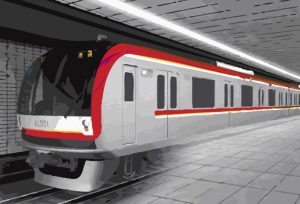THE JAPAN International Cooperation Agency (JICA) is keen on providing more funding support for road and railway projects in the Philippines.
“We are very keen and enthusiastic not just to maintain but to expand our cooperation with the Philippines as a most reliable partner,” JICA Chief Representative in the Philippines Takema Sakamoto told reporters on the sidelines of a forum on Tuesday.
“In the SONA (State of the Nation Address), President Ferdinand R. Marcos, Jr. mentioned several project names we are involved in,” Mr. Sakamoto said, citing the Plaridel Bypass Road, the Metro Manila Subway, and the North-South Commuter Railway (NSCR).
The Finance department and JICA have already signed loan deals for those projects. However, the huge funding requirements of these projects may require “further financial intervention” from JICA, he added.
While JICA has yet to finalize how much in total loans would be approved this year, Mr. Sakamoto said he hopes it would be higher than the ¥300 billion to ¥400 billion (around P115 billion to P153 billion) approved last year.
“I would like to convince Tokyo to mobilize more money. Of course, it depends on the decision of the government of Japan and taxpayers or the Japanese congressmen. So, I cannot say an exact figure or specific output now,” Mr. Sakamoto said.
In March, the Department of Finance (DoF) and JICA signed the third tranche of the loan agreement worth ¥150 billion (around P57 billion) for the first phase of the Metro Manila Subway Project.
Both sides also inked a ¥100-billion loan agreement that covers the first tranche for the Dalton Pass East Alignment Road Project that will connect San Jose City, Nueva Ecija to Aritao, Nueva Vizcaya.
JICA has also extended P4.25 billion in funding for the Plaridel Bypass Project-Phase 3, which traverses Balagtas, Guiguinto, Plaridel, Bustos and San Rafael in Bulacan.
The P873-billion NSCR is being co-financed by JICA and the Asian Development Bank. The 147-kilometer NSCR will connect Malolos, Bulacan with Clark International Airport, and Tutuban, Manila with Calamba, Laguna. It will have 35 stations and three depots.
Mr. Sakamoto also emphasized the need to address the persistent traffic congestion in the capital region. An earlier study by the JICA showed traffic congestion costs the Philippine economy P3.5 billion a day.
“We need to make (roads) more modernized, in collaboration with a modernized railway system, it’s a combination. For example, feeder transportation should be developed further,” he said.
Mr. Sakamoto said the condition of roads in Metro Manila is “another very important challenge” that should be tackled. He wants to consult with the Departments of Transportation, Public Works and Highways, and the Metro Manila Development Authority (MMDA) on this matter.
JICA is also exploring a new technical cooperation with the MMDA that will modernize the latter’s intelligent transport system, Mr. Sakamoto said.
Last week, JICA and DoTr inked a three-year technical cooperation project that aims to improve the services of public utility vehicles and help decongest Metro Manila.
The Philippines heavily relies on official development assistance (ODA) to fund key projects amid limited fiscal space.
Japan was the country’s second-largest source of ODA in 2022, accounting for 30.75% or $9.96 billion of the total, latest data from National Economic and Development Authority showed. — Beatriz Marie D. Cruz
